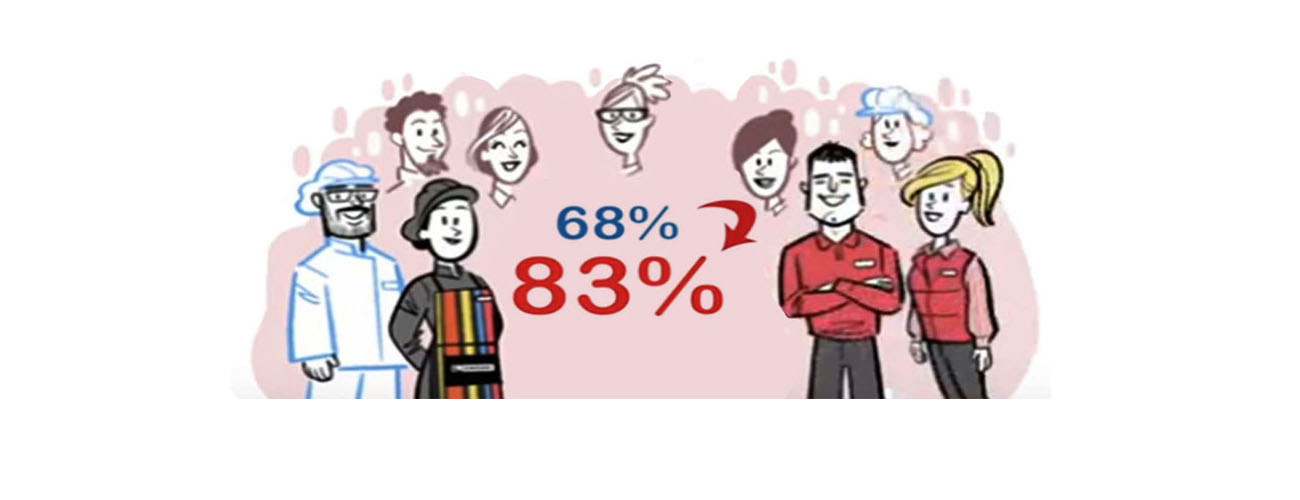In retail, how do you turn the store experience into something unique for the customer? “When the sale is made with gratitude to the customer and they feel that we have given them something more than the product itself, we sell much more,” affirmed Josu Madariaga, director of Customer Experience at Eroski, after working with Madavi.
In this project, Madavi’s challenge was: “How to help Eroski become a leader in customer service”. And the results are there to see: customer perception of Eroski’s service rose from 68 to 83% / 96%. As well, each of the stores has reached number 1 ranking in customer satisfaction! Sales with gratitude make the customer leave much more satisfied, the store teams get much more involved and sales increase.
Learning from the experiences of each salesperson
How was this magnificent result achieved? Learning from the best experiences of each salesperson. Real stories and applicable lessons. It is what we at Madavi call positive deviation, a change methodology with exceptional results.
Positive deviation is a form of change based on observation. Actually, what it consists of is to study those who achieve exceptional results with the same resources.
The positive deviation approach is totally different from the traditional approach to stimulating better performance in any area of Retail.
People tend to focus more on the negative than the positive. When a problem arises in a store we wonder what has gone wrong. This means that when the customer complains we analyze it and try to find out why, which in general leads us to find someone to blame, when what we want is change.
A much more efficient approach is to ask ourselves what works with the customer and how we can reproduce it. That is to say, focus on what DOES work. For example, in Retail, learning from the best experiences of each salesperson.
The change begins when we investigate how those exceptional results are achieved with the same resources; this is shared and provides learning throughout the organization.
The key is for the team itself to be the owner of the change process
This is not about someone outside discovering the positive deviation and explaining to others what they should do. The key is that the team itself should own the change process, from the inquiry phase, through to the adoption of new behaviours and actions. As Alberto Cañas, Director of Commercial and Customer Adaptation and Planning at Eroski, told us, the key in his case was the involvement of the entire team. “Involvement that was achieved thanks to Madavi’s way of working”, in his words.
“The teams in the stores are the ones that get the results because they are the ones that interact with the customer.”
A cultural change, towards an appreciative culture in Retail
The whole process must be accompanied by a cultural change because we do things when we believe in them. Thus, in the case of Eroski, and with support from Madavi, they moved towards an appreciative culture.
An appreciative culture that they already share in Vegalsa as well. We are working with them on 41 stores in Galicia.
Their goal is to be the best in customer service and increase sales. How? Making the most of the daily interactions with the customer; thousands of interactions of people working in stores with their customers. It is about promoting and implementing an appreciative culture, the principles of abundance and simultaneity make everything much easier: it is seeing the best of what there is and bringing everyone in towards that attractive image of the future.
The best customer experiences in Retail are outside the manuals
We are also working with Massimo Dutti with that objective of turning the store experience into something unique for the customer.
At Madavi we always say that the best customer experiences are outside the manuals, and that whoever deals with the customer is the CEO of the company at that time, and therefore, they need to act with complete autonomy.
The key point is how to do this with thousands of employees, who often earn modest salaries in demanding jobs with high staff turnover.
At Madavi, we do it from the points of strength. Analyzing the best experiences with customers, according to their protagonists, the employees. In appreciative meetings of short duration that are held periodically.


